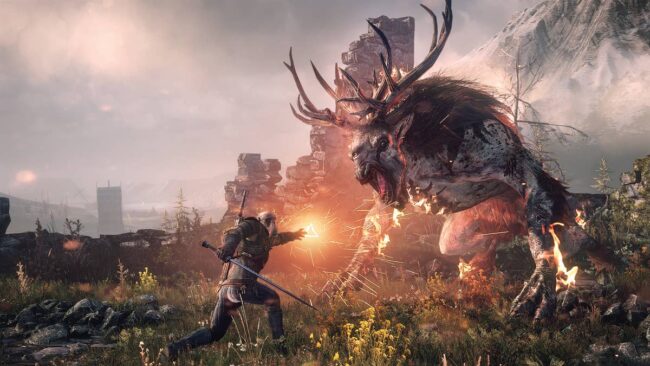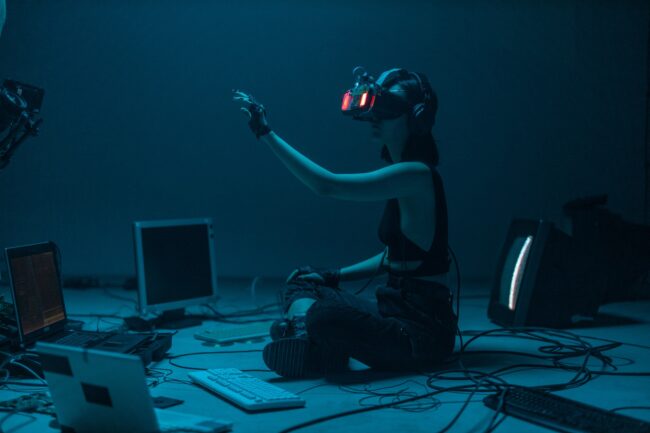Gaming is no longer just a hobby or a pastime—it has morphed into a booming industry and a platform for innovation, with generative AI playing a significant role in its transformation. The advent of artificial intelligence, particularly generative AI, has deeply influenced how games are developed, played, and experienced. This article explores how generative AI has enhanced and redefined immersive gaming experiences in numerous ways.
What is Generative AI?

Generative AI is a subset of artificial intelligence that leverages machine learning techniques to produce content. It can generate new data instances that are similar to a training set. In simpler terms, it’s an AI that can create – from music and images to game levels and characters.
Generative AI in Gaming
In the gaming industry, generative AI has emerged as a powerful tool to automate and enrich several aspects of game development and gameplay. From procedurally generating vast, explorable worlds to creating adaptive enemies and non-player characters (NPCs), generative AI has significantly transformed the gaming landscape. For more ideas on how generative AI can revolutionize gaming, check out this list of 50 Top Generative AI Gaming Ideas.
The Rise of Procedural Generation

One of the primary applications of generative AI in gaming is procedural generation. This is the process where game content, like levels, maps, items, or even entire universes, is algorithmically generated rather than manually crafted.
Influencing Immersion Through Procedural Generation
Generative AI enhances immersion by creating unique, dynamic, and unpredictable environments, significantly improving replayability. This approach adds an extra layer of depth to games, making each playthrough a new and exciting experience, and thus increasing player engagement.
Generative AI and Game Characters

Characters are a vital part of the narrative and the overall game experience. Generative AI can create diverse and dynamic characters, enhancing the immersive aspect of games.
Character Customization and NPCs
With generative AI, games can offer highly detailed character customization, allowing players to shape their characters’ appearance, attributes, and even backstories. Similarly, NPCs created with generative AI can exhibit more varied and realistic behavior, responding differently based on the player’s actions, adding depth to the game world.
Adaptive Difficulty and Gameplay

Generative AI also has a significant influence on game difficulty and player progression. It allows the creation of adaptive difficulty systems, making games more accessible and enjoyable.
Personalizing Player Experience
Through learning from player behavior and preferences, generative AI can create personalized challenges, adjusting the difficulty level in real time. This personalized approach makes games more immersive, keeping players invested and motivated to progress further.
The Role of Generative AI in Game Narratives

Storytelling in games is evolving, and generative AI has a big part to play. It has the potential to generate complex and branching narratives that respond to player decisions.
Dynamic and Responsive Storytelling
By using generative AI, games can offer narratives that evolve based on player choices, creating a more immersive and personalized experience. This dynamic storytelling approach makes players feel their decisions have real weight and consequences in the game world.
Generative AI and Game Audio
Generative AI isn’t only about visual content; it also plays a significant role in creating game audio. From sound effects to game soundtracks, AI is changing how game audio is designed and implemented.
Creating Immersive Soundscapes
With generative AI, developers can create dynamic soundtracks and sound effects that adapt to in-game situations, contributing to a more immersive experience. This means that music tempo, volume, and style can change in real-time, complementing the on-screen action and enhancing the emotional impact.
The Impact on Virtual Reality (VR) Gaming

Virtual reality games are arguably the most immersive type of games, and generative AI can significantly enhance the realism and depth of these experiences.
Enhancing Realism in VR
In VR gaming, generative AI can be used to create more interactive and realistic environments, characters, and narratives. It can generate dynamic scenarios, where the game world responds to player actions in a highly nuanced manner. This ability to generate responsive and adaptive content can dramatically increase immersion in VR games.
Generative AI and Multiplayer Gaming

The rise of multiplayer and online gaming presents unique challenges and opportunities. Generative AI can play a crucial role in enhancing these experiences, too.
Improving Matchmaking and Player Interactions
Generative AI can improve matchmaking by analyzing player behavior and skills to create balanced and competitive matches. Additionally, AI can generate dynamic in-game events in multiplayer environments, encouraging player interaction and cooperation, and leading to more engaging and immersive multiplayer experiences.
The Potential of Generative AI in eSports

eSports, the competitive side of gaming, is another area where generative AI can have a significant impact. From improving player training to enhancing viewer experiences, AI has a lot to offer.
Creating Dynamic eSports Experiences
Generative AI can create new and dynamic scenarios for training, helping players improve their skills and strategies. For viewers, AI can generate highlights, analyze game strategies, and provide insightful real-time commentary, making eSports more engaging and immersive to watch.
The Ethical Aspects of Generative AI in Gaming

As with any powerful technology, generative AI brings ethical considerations, especially in the context of immersive gaming experiences.
Balancing AI and Player Fairness
It’s essential to ensure the application of AI in games does not compromise fairness. For instance, if AI learns and adapts to a player’s strategy to the point where it becomes unbearable, it can lead to player frustration rather than immersion. Balancing AI capabilities to ensure a fair and enjoyable game experience is a crucial aspect to consider.
Accessibility and Generative AI

Generative AI also offers the potential to make gaming more accessible. By adapting to the needs and abilities of different players, it can create more inclusive gaming experiences.
Tailoring Games to All Players
Generative AI can adjust the game difficulty, controls, and visual settings based on a player’s abilities and preferences. This could significantly improve the accessibility of games, enabling a broader range of people to engage with and enjoy gaming, ultimately making games more immersive for all players.
Conclusion
Generative AI has undeniably become a transformative force in the gaming industry. Creating dynamic and personalized content, it enhances immersive gaming experiences in ways that were unimaginable just a few years ago. However, as with any technological advancement, it brings new challenges and ethical considerations that the industry must navigate. As we move forward, the influence of generative AI on gaming will likely continue to grow, revolutionizing how we create, play, and experience games.
